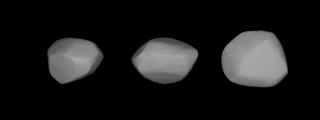Related Research Articles

Ismene is a very large main belt asteroid. It was discovered by German-American astronomer C. H. F. Peters on September 22, 1878, in Clinton, New York, and named after Ismene, the sister of Antigone in Greek mythology.

Kriemhild is a main belt asteroid that was discovered by Austrian astronomer Johann Palisa on 22 September 1884 in Vienna and was named after Kriemhild, a mythological Germanic princess, by Moriz von Kuffner, a Viennese industrialist and sponsor of astronomy.

Atropos is a typical Main belt asteroid that was discovered by Austrian astronomer Johann Palisa on 8 March 1888 in Vienna.

Bavaria is a carbonaceous background asteroid from the intermediate asteroid belt, approximately 54 kilometers. It was discovered by Johann Palisa on 16 November 1890 in Vienna.

Siri is a main belt asteroid in orbit around the Sun. It was discovered by German astronomer Max Wolf on 19 March 1892 in Heidelberg. The origin of this asteroid's name is unclear. On October 5, 2092, 332 Siri will pass 4,981,670 km (3,095,470 mi) from the asteroid 29 Amphitrite with a relative velocity of 2.054 kilometers per second.

Eduarda is a main belt asteroid that was discovered by German astronomer Max Wolf on 25 September 1892 in Heidelberg. It was named after German banker and amateur astronomer Heinrich Eduard von Lade.

Persephone is a main belt asteroid. It was discovered by German astronomer Max Wolf on 23 February 1895 in Heidelberg.
Elisabetha is a large main belt asteroid that was discovered by German astronomer Max Wolf on 7 January 1896 in Heidelberg. It may have been named after his mother, Elise Wolf.

Papagena is an asteroid that was discovered by German astronomer Max Wolf on 7 June 1901. Its provisional name was 1901 GN.
Emita is a minor planet orbiting the Sun that was discovered by the Italian astronomer Luigi Carnera on February 12, 1902. The meaning of the asteroid's proper name remains unknown.
Selinur is a minor planet, specifically an asteroid orbiting in the asteroid belt. Like 501 Urhixidur and 502 Sigune, it is named after a character in Friedrich Theodor Vischer's then-bestseller satirical novel Auch Einer.

Sigune is a minor planet, specifically an asteroid orbiting primarily in the asteroid belt. Like 501 Urhixidur and 500 Selinur, it is named after a character in Friedrich Theodor Vischer's then-bestseller satirical novel Auch Einer.
Jessonda is a minor planet orbiting the Sun. According to the Catalogue of Minor Planet Names and Discovery Circumstances, it is "named presumably after the character in the opera of the same name by the German composer, conductor and violinist Ludwig Spohr (1784-1859), one of the leading composers in the early romantic period.'
Ortrud is a minor planet orbiting the Sun. It is located in the Main Belt. In light of the practice of the discover c. 1904 to name his asteroids after female characters in opera, it is likely that Ortrud is named after a character in Richard Wagner's opera Lohengrin.
Suleika is a minor planet orbiting the Sun. Previously designated as 1905 QK, it was discovered by German astronomer Paul Götz on 6 April 1905 from Heidelberg, Germany.
Sidonia is a minor planet orbiting the Sun that was discovered by the German astronomer August Kopff on November 3, 1905. It was named after a character in Christoph Willibald Gluck's opera Armide. The name may have been inspired by the asteroid's provisional designation 1905 SD.

708 Raphaela is a minor planet orbiting the Sun.
799 Gudula is a minor planet orbiting the Sun discovered by German astronomer Karl Wilhelm Reinmuth on 9 March 1915 at the Heidelberg observatory.
871 Amneris is a minor planet orbiting the Sun. It is the namesake of the Amneris family, a subgroup of the Flora family of Main Belt asteroids.
947 Monterosa is a minor planet orbiting the Sun.
References
- ↑ "558 Carmen (1905 QB)". JPL Small-Body Database . NASA/Jet Propulsion Laboratory . Retrieved 5 May 2016.
- ↑ Gil-Hutton, Ricardo (April 1998), "Photometry of Asteroids 558 Carmen, 613 Ginevra, and 1124 Stroobantia", Revista Mexicana de Astronomía y Astrofísica, 34: 9–11, Bibcode:1998RMxAA..34....9G.